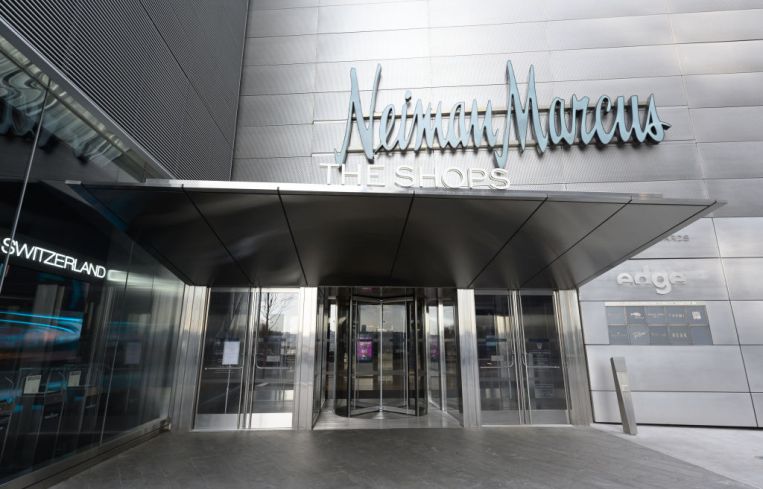Luxury Retailer Neiman Marcus Files for Bankruptcy
By Nicholas Rizzi May 7, 2020 2:53 pm
reprints
Luxury retailer Neiman Marcus filed for bankruptcy today after weeks of speculation, the first major department store to start Chapter 11 proceedings during the coronavirus pandemic.
Neiman Marcus is hindered with nearly $5 billion in debt and secured a $675 loan from its creditors to continue operations during the bankruptcy proceedings, the company said in a statement. It hopes to get another $750 million in financing and plans to pair down about $4 billion of its debt in the restructuring process.
“Prior to COVID-19, Neiman Marcus Group was making solid progress on our journey to long-term profitable and sustainable growth,” Geoffroy van Raemdonck, the CEO of parent company Neiman Marcus Group, said in a statement. “However, like most businesses today, we are facing unprecedented disruption caused by the COVID-19 pandemic, which has placed inexorable pressure on our business.”
The filing marks the second major blow for the retail world this week, with preppy clothing retailer J.Crew filing for bankruptcy on Monday.
Neiman has no plans to liquidate or permanently close any of its locations, as of now, and extended its COVID-19 store shutdowns until at least May 31, the company said today.
Many iconic luxury brands are listed among Neiman’s top debtors including Chanel, which is owed $6 million; Gucci, which is owed $3.2 million and Dolce and Gabbana which is owed $2.7 million, according to the filings.
Before the bankruptcy, the Dallas-based chain — which also owns Bergdorf Goodman and Neiman Marcus Last Call — skipped out on millions of dollars in payments on its debt as the coronavirus pandemic forced it to temporarily shutter its nearly 70 stores, Reuters reported. It also furloughed most of its nearly 14,000 employees.
The company was already marching towards a bankruptcy filing as it struggled to compete with online shopping until the coronavirus epidemic “accelerated it at warp speed,” retail consultant Kate Newlin previously told Commercial Observer.
“This was going to be a slow erosion,” Newlin said. “There’s no way to make the numbers work without a great deal of outside capital and a sucker every five years who’s willing to say, ‘Oh, wait, we can run this thing’ … Now there’s no place to hide.”
Standard & Poor’s analysts lowered Neiman Marcus’ credit rating into the “junk” category last month and noted it thinks “the company’s prospects for a turnaround are increasingly low,” Reuters reported.
However, luxury retail consultant Soozan Baxter thinks Neiman is in a better place to survive than a lot of its competitors and the bankruptcy will give them a chance to shed underperforming stores, those posting $40 million or less in sales.
“This is a really good time for them to look inward and recalibrate their business,” Baxter said. “Neiman does a lot of things really, really well. This is more a situation where they got bought by private equity before the financial crash and since then it’s been really difficult to get their sea legs.”
While Baxter said it’s likely the company will shed some of its locations, its highly unlikely the recently opened outpost at Hudson Yards’ retail complex in Manhattan will be on the chopping block.
“There are no fewer than 20 stores that would close before Hudson Yards in my opinion,” said Baxter, who consulted on the Hudson Yards’ project. “That, to me, isn’t even something that should be a point of consideration.”
Neiman leases 188,000 square feet at Hudson Yards and was the first tenant to sign on to the seven-story retail structure. Losing Neiman would be a huge blow for Related Companies and something the developer would work hard to avoid.
“I want to take a guess Related and their management company works with [Neiman] to keep them there,” James Famularo, the president of Meridian Retail Leasing, previously told CO. “It’s just too new of a project.”
Neiman was founded in Dallas in 1907 by Herbet Marcus and grew to become one of the country’s most iconic luxury retail stores. It was bought out by private equity firms Ares Management and the Canada Pension Plan Investment Board (CPPIB) for about $6 billion in 2013, Reuters reported.
The owners have been trying to turn the company around and announced in March that it would close the majority of its discount Last Call stores while trying to sell two of its Texas distribution centers, Adweek reported.
Neiman is far from the only retailer struggling to survive during the coronavirus pandemic that has decimated retail sales in the country.
In March, retail sales fell a record 8.7 percent around the country and economists expect April’s numbers to be much worse since many stores weren’t forced to shutter until late March.
nordstrom announced this week that it planned to permanently close 16 stores and Lord & Taylor — which was bought by a clothing rental startup last year — will reportedly liquidate merchandise in all of its locations as soon as it’s able to reopen.
Department stores were already struggling to survive and Neiman’s filing comes after Barneys New York filed for bankruptcy in August 2019, as CO reported.
J.C. Penney and Brooks Brothers are rumored to be considered bankruptcy or looking for buyers.



